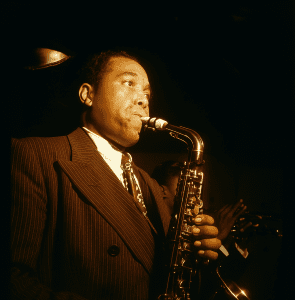Blog, Chroniclers, Jazz on the Tube Interview
Download the mp3 here
We’re following up on our special program “Ornette: Deep from the Heart of Texas” with Dave Oliphant
We go even further down this fascinating rabbit hole.
When Ornette was 19 (1949), he had an extended gig in Amarillo, Texas where he regularly jammed “after hours” with a legendary avant-garde hillbilly steel guitar player.
The history of American music is richer and more surprising than we can imagine!
NOTE: There were THREE Billy Briggs in Texas: a fiddle player, a saxophonist, and the artist in question.
You can get Michael H. Price’s fascinating book “Thick Lights, Loud Smoke, and Dim, Dim Music” here:
Note: It was a performance of this tune by a visiting jazz band performing in the auditorium of I.M. Terrell High School in Fort Worth that Ornette says inspired him with the idea of playing the saxophone (c. 1943)
– Ken McCarthy
Jazz on the Tube
P.S. Our unique programming is made possible by help from people like you. Learn how you can contribute to our efforts here: Support Jazz on the Tube
Thanks.
Blog, Chroniclers, Jazz on the Tube Interview, Ornette
Click here if you have a memory of this artist that you’d like to share
Download the mp3 here
Avant-garde genius or one of many Master Musicians who sprung from the earth of one of the most fertile musical cradles the world has ever seen?
Of course, Ornette is both.
In this unique podcast we focus on what others have ignored: How Ornette comes straight from the big open musical heart of Texas.
Move over Brazil, Cuba, New Orleans…Texas is in the house.
Errata
Three misspeaks
1. “Captain Dyett”
2. “When Ornette worked Silas Green”
3. Eddie Durham wore his hair long and braided in a Native American style as a child, but probably cut it long before becoming an adult. (In addition to being of Afro-American, Mexican and Irish ancestry, Durham’s mother was of Cherokee descent and his father of Mohawk. His first language as a child was Spanish.)
– Ken McCarthy
Jazz on the Tube
P.S. Our unique programming is made possible by help from people like you. Learn how you can contribute to our efforts here: Support Jazz on the Tube
Thanks.
Afro-Cuban culture, Artist-Educators, Cuba, Jazz on the Tube Interview, Latin Jazz, Podcasts, Producer-Presenters, Puerto Rico, Video, Video and audio
Download the mp3 here
Produced by Coco Records in 1974
– Ken McCarthy
Jazz on the Tube
P.S. Our unique programming is made possible by help from people like you. Learn how you can contribute to our efforts here: Support Jazz on the Tube
Thanks.
Go to Cuba with Jazz on the Tube as your guide:
Click here for details
Blog, Chroniclers, Jazz on the Tube Interview
Download the mp3 here
Make sure you check out the video below.
You know the narrative…
“Jazz started in New Orleans and traveled to Chicago and Kansas City and New York.”
Historians are starting to come to a more sophisticated – and exciting – view of the music’s origins.
In this program we look at the unheralded role San Francisco played in the creation of jazz. In the second half of the 19th and early 20th century, San Francisco was the biggest and most dynamic city west of the Mississippi River and a place of dazzling diversity.
An international port, a vibrant Afro-American community, a prosperous place that supported a wide variety of live music venues and occasions – old San Francisco and the Bay Area had all the ingredients to be a hotbed for music creativity.
1914 – San Francisco – silent movie
Three years after this was filmed, the first jazz sound recording was made in 1917. It’s pretty clear, here was something going on in San Francisco well before the heralded “Jazz Age” began.
Who’s the band in the film?
The best scholarly guess is Sid LeProtti’s So Different Jazz Band, San Fransisco. Sid LeProtti, piano; Adam “Slocum” Mitchell, clarinet, and Gerald Wells, flute. Probably shot outdoors.
What are they dancing?
A quadrille (a square dance) – but with a difference. How I wish I could hear this music!
(1952) RAW UNEDITED – Turk Murphy interviews San Francisco jazz pianist Sid LeProtti (born 1886) – with music
Other Jazz on the Tube podcasts that touch on the diverse origins of jazz
The huge contribution of Texans and Oklahomans to jazz
https://www.jazzonthetube.com/interview-with-dave-oliphant-about-texan-jazz/
Afro-American “barbershop” and jazz
https://www.jazzonthetube.com/vic-hobson-and-the-roots-of-louis-armstrongs-music/
A broader view of the origins of jazz
https://www.jazzonthetube.com/interview-with-professor-douglas-henry-danielslester-leaps-in-jazz-in-asia-and-more/
– Ken McCarthy
Jazz on the Tube
P.S. Our unique programming is made possible by help from people like you. Learn how you can contribute to our efforts here: Support Jazz on the Tube
Thanks.
Artist-Educators, Blog, Chroniclers, Jazz on the Tube Interview, Podcasts, Video
Interview with Abraham Ravett
Download the mp3 here
Ken McCarthy’s Jazz on the Tube interviews filmmaker Abraham Ravett about his film “Forgotten Tenor: A Tribute to Tenor Saxophonist Wardell Gray.”
Tenor saxophone giant Wardell Gray was born February 13, 1921, in Oklahoma City. OK. He was a graduate of the Cass Technical High School, a Detroit school that also lists Donald Byrd, Lucky Thompson, and Al McKibbon as distinguished alumni.
You can order a DVD copy of the film “Forgotten Tenor: A Tribute to Saxophonist Wardell Gray” direct from the filmmaker by writing to aravett AT hampshire DOT edu
Wardell is the soloing tenor on this Count Basie performance
You can order a DVD copy of the film “Forgotten Tenor: A Tribute to Saxophonist Wardell Gray” direct from the filmmaker by writing to aravett AT hampshire DOT edu
– Ken McCarthy
Jazz on the Tube
P.S. Our unique programming is made possible by help from people like you. Learn how you can contribute to our efforts here: Support Jazz on the Tube
Thanks.
Artist-Educators, Blog, Chroniclers, Jazz on the Tube Interview, Podcasts
Interview with Vic Hobson
Download the mp3 here
Louis Armstrong was a genius – no doubt about that.
But there’s no such thing as a genius in a vacuum.
For some strange reason, the culture and community that gave birth to Louis Armstrong is given short shrift in accounts of his life and art.
In his autobiography and in interviews, Armstrong painted a vivid picture of the world he grew up in, but until now, there has been no in-depth inquiry into what he meant when he said things like “I figure singing and playing is the same,” or, “Singing was more into my blood than the trumpet.”
Now thanks to Vic Hobson’s book “Creating the Jazz Solo” we’re starting to understand what he meant.
Click here to learn more about Vic Hobson’s work:
More
Comments and insights sought (scroll to the bottom of the page)
Comments and insights sought from musicians, music educators and scholars. We’re opening this up to a moderated discussion.
Our goal: To discover if there was something valuable and now lost in music education that can be productively revived.
Musical references:
– Ken McCarthy
Jazz on the Tube
P.S. Our unique programming is made possible by help from people like you. Learn how you can contribute to our efforts here: Support Jazz on the Tube
Thanks.




